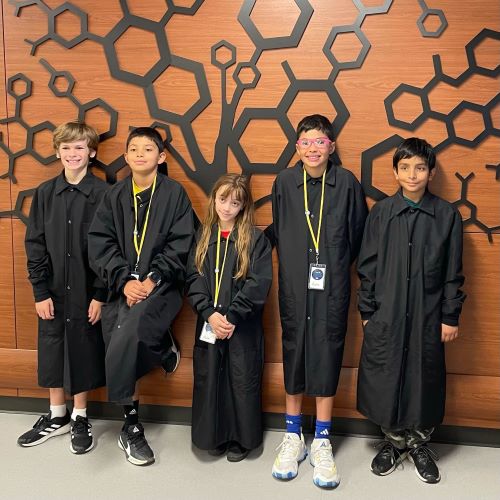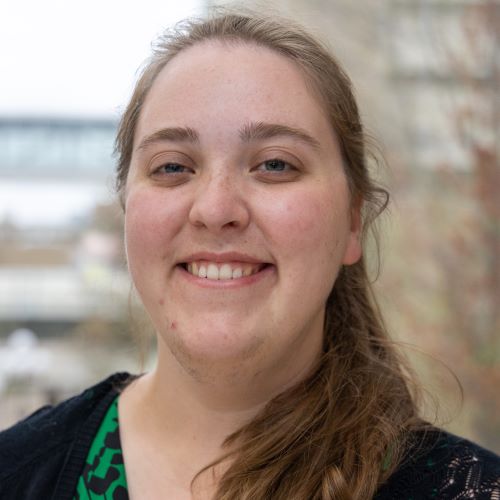News Archive
Filter by Division
Filter by Categories
Potions in Pathology
May 29, 2024 / Pathology InformaticsWashtenaw Elementary Science Olympiad (WESO) is a volunteer organization and a division of the national Science Olympiad that coordinates a county-wide science competition amongst all elementary schools in Washtenaw County. Students choose their topic of interest in January and teams are formed with coaches (generally parent or teacher volunteers)... “I was roped into coaching Potions because my middle child was interested in competing in Potions and there was no coach,” explained Eric Jedynak, from Pathology Informatics. “I figured that I had some basic chemistry and laboratory experience, however, both were a little rusty.”
13th Annual Advances in Forensic Pathology
May 29, 2024 / ForensicsThe 2024 Conference Recap
MCP Graduate Student Koral Campbell Named Rogel Graduate Student Scholar
May 28, 2024 / Phd ProgramCongratulations to Koral Campbell, Molecular and Cellular Pathology graduate student on being awarded the Rogel Cancer Center’s TrEC Scholarships Graduate Student Scholarship 2024. Koral’s winning application on The Role of High Fat Diet in Clonal Hematopoiesis and Leukemogenesis earned her a $25,000 award to offset her tuition and fees for 2024. In addition, as a Rogel trainee, she will have priority access to training opportunities and additional scholarships.
Inspiring Future Young Healthcare Leaders
May 23, 2024 / EducationThe third annual Youth Summit at the Big House took place on Saturday, May 18th where students from across southeast Detroit gathered together to learn about healthcare, pathology, and more.
In Memoriam: Hope Jones
May 21, 2024 / In MemoriamThe Department of Pathology is sad to report the passing of another of our teammates, Hope Jones. Hope passed away in a car accident near her home on Sunday, May 12, 2024. A funeral memorial service will be Saturday, May 25, starting at 10:30am at Greater Love Tabernacle Church (17617 Plymouth Rd, Detroit, 48227).
Large study identifies biomarkers for rare kidney tumors
May 15, 2024 / ProteomicsWith 20 subtypes of Renal Cell Carcinoma (RCC) listed by the World Health Organization in 2022, determining the specific type of RCC and the correct treatment protocol for patients can be daunting. Only seven of the 20 subtypes had been defined by specific molecular changes and the 20% of RCCs that are classified as non-clear cell RCCs (non-ccRCC), were primarily identified only by histopathologic features. The driving genetic changes had not been identified. A large multi-institutional team making up the Clinical Proteomic Tumor Analysis Consortium, including several researchers from Michigan Medicine’s Department of Pathology, performed multi-omics data analysis on 48 non-ccRCC and 103 ccRCC tumors as well as 101 normal adjacent tissues to study the genetic aberrations found in these tumor types. The findings of this research were recently published in Cell Reports Medicine, with Pathology’s Drs. Alexey Nesvizhskii and Saravana Mohan Dhanasekaran as senior authors and Dr. Ginny Xiaohe Li as first author.
Michael Pitter becomes Dr. Michael Pitter
May 14, 2024 / Phd ProgramMolecular and Cellular Pathology Graduate Student Michael Pitter successfully defended his PhD thesis on March 15, 2024, and officially became Michael Pitter, PhD, MS. Pitter completed his thesis research in the laboratory of Dr. Weiping Zou, the Charles B. de Nancrede Professor, Professor of Pathology and Surgery. Pitter’s thesis, “The Role of Peptidyl Arginine Deiminases in Regulating Anti-tumor Responses in Immune Cells” reports on his research which demonstrated that PAD2 and PAD4 enzymatic activity supported tumor growth and when inhibited, may serve as a novel target in the treatment of cancer. He also discovered that PAD4 citrullinated STAT1, controlling STAT1 transcriptional activity, and consequently, MHC-II expression and function in macrophages. This work featured multiple novel findings in macrophage biology which may be exploited for the treatment of cancer and was published in Cell Reports.
Please join us in congratulating Dr. Michael Pitter on the successful completion of his PhD!
Development and Validation of an 18-Gene Urine Test for High-Grade Prostate Cancer
May 13, 2024 / MctpIn a manuscript published this week in JAMA Oncology, senior author Dr. Arul Chinnaiyan and members of the EDRN-PCA3 Study Group reported on their development and validation of a new 18-gene urine-based test for diagnosis of high-grade prostate cancer, MPS2. This test was initially developed in the Department of Pathology.
With $5M Grant, Rogel Team Will Conduct Preclinical Work to Develop Drugs Targeting Cancer Master Regulator
May 8, 2024 / MctpUniversity of Michigan Rogel Cancer Center researcher Arul Chinnaiyan, MD, PhD, has received a $5 million grant from the J.C. Kennedy Foundation to conduct laboratory tests of a potential drug candidate targeting a master regulator that controls the majority of genes involved in the most challenging type of prostate cancer. The SWI/SNF chromatin remodeling complex was previously found to facilitate access to enhancers that oncogenes can bind to, driving downstream gene expression in cancer. Degrading a subunit of this complex blocks the oncogenes [...]
From the Xi'an to Ann Arbor
May 1, 2024 / Faculty SpotlightDr. Xiaobing Jin Shares His Story









 ON THE COVER
ON THE COVER
 ON THE COVER
ON THE COVER
 ON THE COVER
ON THE COVER
 ON THE COVER
ON THE COVER
 ON THE COVER
ON THE COVER
 ON THE COVER
ON THE COVER
 ON THE COVER
ON THE COVER
 ON THE COVER
ON THE COVER
 ON THE COVER
ON THE COVER
 ON THE COVER
ON THE COVER
 ON THE COVER
ON THE COVER
